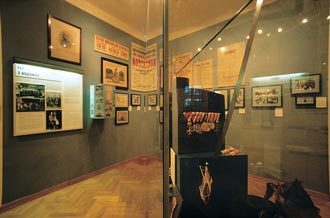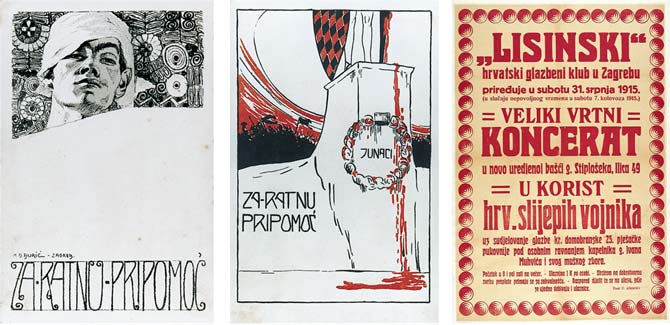Permanent Display 39. Echoes from the Battlefield
 The beginning of World War I was marked in Zagreb by demonstrations and the demolition of the Great Café on Jelačić Square. On July 28, 1914, Austria-Hungary declared war on Serbia. Mobilisation was carried out in Zagreb. The 53rd Zagreb Infantry Regiment and the 25th Zagreb Home Guard Regiment took part in the first military operations on the Balkan front, and from 1915 on were to fight on the eastern and Italian fronts.
The beginning of World War I was marked in Zagreb by demonstrations and the demolition of the Great Café on Jelačić Square. On July 28, 1914, Austria-Hungary declared war on Serbia. Mobilisation was carried out in Zagreb. The 53rd Zagreb Infantry Regiment and the 25th Zagreb Home Guard Regiment took part in the first military operations on the Balkan front, and from 1915 on were to fight on the eastern and Italian fronts.
The 13th Zagreb Corps bled for the Monarchy on all the fronts. The splendid processions that marked the start of the war faded away, and the wounded, captives and the hungry began to pour into Zagreb. Austria-Hungary at once found itself in a very grave position, manifested in the requisition of strategic raw materials and food shortages. In 1915 the bells were requisitioned, and the Rudolph Barracks, the Church of St Blaise and the National and University Library lost their roofs.
Bread rationing coupons were introduced in 1915, and the commissioners also brought in meatless Tuesdays and Fridays. From 1916 on there was a salt shortage. In 1917, lard was dealt out on coupons. Shortage of food was the main problem, a problem aggravated by the collapse of the supply routes from areas ravaged by bands of deserters (“zeleni kader”). In 1918 bread reached the price of 6 crowns for one loaf.
Military successes did not make things any easier. Battles resulted in the streams of dead and wounded that poured into Zagreb. Schools were turned into hospitals (1915) and refuges for war orphans (1917). A lazaretto was built for soldiers on Mirogojska cesta in 1915. The work of charitable organisations (Committee of the Zagreb Ladies) and the Red Cross was stepped up, but was still incapable of solving a difficult situation made even worse by the influx of the starving from Bosnia.

With the death of Francis Joseph (1916), the Empire too passed imperceptibly away. At the end of 1918, the centuries-old Habsburg monarchy collapsed, the Yugoslav union was created, and in consequence of crucial and tempestuous events, Croatia ceased to exist as a state in its own right.
Ivan Ružić

